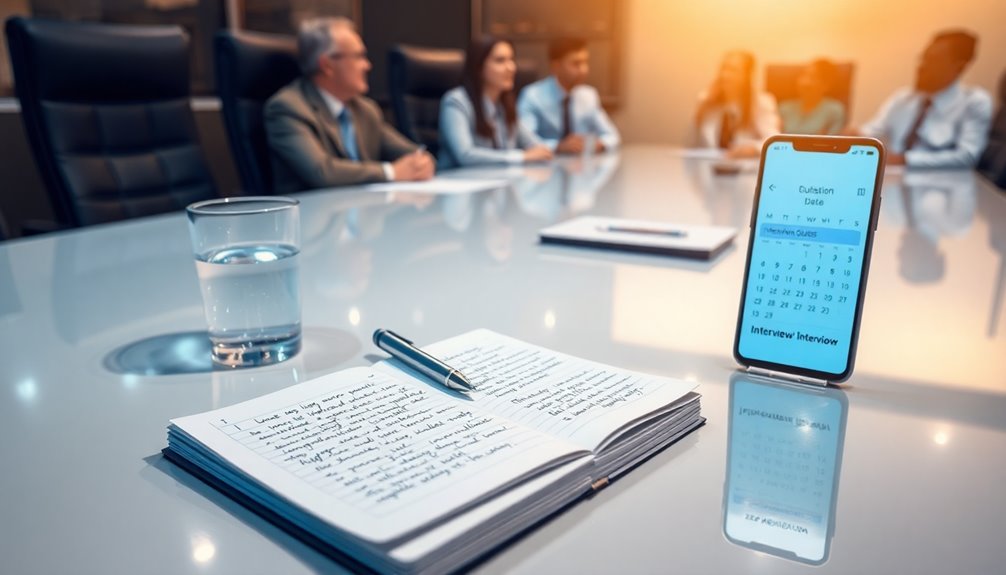Mastering the interview process can feel like an exciting adventure! Start by preparing, which means researching the company and role. Then, practice answers to common questions. During the interview, be yourself and showcase your skills and personality. Don't forget to follow up with a thank-you email! This shows your interest and leaves a great impression. Remember, every stage matters, from initial chats to in-depth discussions. Think of it as a treasure hunt for your dream job! There's so much more to explore about nailing this process that you'll want to stick around for all the tips and tricks!
Key Takeaways
- Thoroughly research the company and role to tailor your questions and showcase genuine interest during the interview.
- Prepare for various question types, including behavioral, situational, and technical, to demonstrate your skills effectively.
- Practice your responses to common interview questions to enhance your confidence and clarity during the conversation.
- Follow up with a thank-you email within 24 hours, highlighting key discussion points and reiterating your fit for the role.
- Embrace a growth mindset, showcasing adaptability and positivity throughout the interview process to build a strong rapport with interviewers.
Overview of the Interview Process

When it comes to hiring, the interview process plays a vital role in finding the right fit for your company.
It's like a treasure hunt, helping you discover candidates who could bring amazing skills and a great attitude to your team!
The process usually has several stages: you prepare by thinking about what you need, then you chat with candidates to see who shines.
You check their skills and how well they might fit with your company's vibe.
This isn't just about filling a position; it's about building a strong relationship with your potential new team member.
Plus, with new trends like virtual interviews, the process is evolving.
Key Steps in Interviewing

The interview process is a journey that involves several key steps to guarantee you find the best candidate for your role. First, you'll prepare by researching the company and the job. Next, review applications to shortlist candidates. After that, conduct initial screenings through phone or video calls to get a feel for their interest and fit. Then, you'll have an in-person interview to dive deeper into their skills and personality. Finally, gather feedback from your team to make a well-informed decision. Here's a quick look at the steps:
| Step | Action | Purpose |
|---|---|---|
| Preparation | Research and create questions | Set a solid foundation |
| Application Review | Shortlist candidates | Focus on the best options |
| Initial Screening | Conduct brief interviews | Assess communication skills |
| In-Person Interview | Face-to-face discussions | Evaluate fit and skills |
Stages of the Interview

After reviewing applications and conducting initial screenings, it's important to understand the distinct stages of the interview process.
First, you prepare by researching the company and crafting questions that fit the role.
Next comes the initial interview, where you chat briefly to see if the candidate is a good match.
Then, you dive deeper in the in-depth interview, asking about their skills and experiences.
After that, it's time for assessment, where you gather feedback from everyone involved and compare the candidates.
Finally, you make a decision, communicate it promptly, and start planning for onboarding!
Each stage is like stepping stones, helping you find the right person for the job while keeping everything friendly and organized.
Types of Interview Questions

Four main types of interview questions can help you assess candidates effectively. These questions make interviews lively and engaging. Here's a quick look at each type:
| Type of Question | Description |
|---|---|
| Behavioral | Ask about past experiences and actions. |
| Situational | Pose hypothetical scenarios to test thinking. |
| General | Inquire about career goals and personal stories. |
| Technical | Assess specific skills or knowledge required. |
Using these questions helps you understand how candidates think and behave in different situations. You'll get a better sense of who they are and how they might fit into your team. Additionally, incorporating executive function questions can provide insights into a candidate's ability to manage tasks and regulate emotions. So, get ready to ask some fun questions and enjoy the process!
Effective Interview Preparation

Effective interview preparation is essential for ensuring a successful hiring process. When you get ready, it helps you shine like a star! Here are some fun tips to help you prepare:
- Research the Company: Learn what the company does and their values. This shows you care!
- Practice Common Questions: Try answering questions you might be asked. It'll make you feel more confident!
- Dress the Part: Wear something neat and professional. Looking good can boost your confidence!
With these steps, you'll walk into the interview feeling ready and excited. Additionally, having a growth mindset can help you adapt and respond positively to the challenges of the interview process.
Remember, preparation is like building a strong bridge that helps you connect with the interviewer.
Post-Interview Follow-Up

How can you make a lasting impression after your interview? One great way is to send a follow-up email!
Start by thanking the interviewer for their time and sharing something you enjoyed about the conversation. This shows your enthusiasm and appreciation.
You can also remind them why you're a good fit for the job. Keep it short and friendly, and don't forget to check for any spelling or grammar errors.
Sending this email within 24 hours is best, as it keeps you fresh in their mind. This simple step can really help you stand out from other candidates. Additionally, consider incorporating audience engagement strategies to further showcase your communication skills and interest in the position.
Additional Resources for Candidates

After sending that thoughtful follow-up email, you might wonder what else can help you stand out in the job search process.
There are some great resources out there that can really boost your confidence and skills! Here are a few to check out:
- Interview Prep Websites: These sites offer tips and common questions to practice.
- Networking Events: Meeting others in your field can open doors and provide insights.
- Books on Job Searching: They can give you strategies and inspiration for your journey.
Utilizing these resources can also help you understand the importance of advance directives in planning your career path, as having a clear direction can enhance your job search experience.
Using these resources can help you feel more prepared and excited as you move forward.
Frequently Asked Questions
How Long Does the Interview Process Typically Take?
The interview process usually takes a few weeks, but it can vary.
First, you've got to prepare by reviewing resumes and scheduling interviews.
Then, you might've a phone interview, followed by in-person chats.
After that, companies need time to decide. Sometimes, they ask for background checks, which can take a little longer.
What Should I Wear to an Interview?
When you're getting ready for an interview, think of it like dressing for a big adventure!
You want to wear something that makes you feel confident and comfortable. A nice shirt and slacks or a smart dress usually work well.
Don't forget to check if the company has a casual vibe or a more formal style!
Just remember, your outfit helps show your excitement and respect for the opportunity ahead!
How Do I Handle Interview Nerves?
When you're feeling nervous before an interview, take a deep breath and remember, it's just a conversation!
Think about the cool things you want to share about yourself. Practice what you'll say with a friend, which can help calm those jitters.
Picture yourself doing great, smiling, and having fun. And don't forget, the interviewer wants to know you, too, so relax and be yourself!
You've got this!
Can I Ask About Salary During the Interview?
Absolutely, you can ask about salary during the interview!
Think of it like a treasure hunt; you want to find out if the reward matches the effort. Just be sure to wait until the interviewer brings it up or when it feels right.
Asking shows you're serious about the role, and it helps you make an informed decision.
What if I Don't Have Relevant Experience?
Don't worry if you don't have relevant experience!
You can highlight your skills and any related activities, like volunteering or school projects. Talk about what you've learned and how it can help you in the job.
Show your enthusiasm and willingness to learn. Employers appreciate a positive attitude and a desire to grow.
Just be yourself and share your unique story; it could make all the difference!
Conclusion
You've explored the exciting elements of the interview process, from preparation to follow-up. With practice, you can confidently conquer each conversation, showcasing your skills and sharing your story. Remember, a positive attitude and preparation make a powerful pair! So, whether you're stepping into the spotlight as a candidate or selecting a superstar for your team, keep these tips in mind. With a little effort and enthusiasm, you'll master the interview magic and achieve amazing results!









